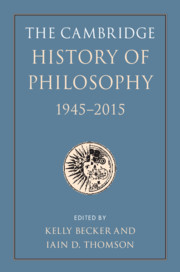Book contents
- The Cambridge History of Philosophy, 1945–2015
- The Cambridge History of Philosophy, 1945–2015
- Copyright page
- Contents
- Contributors
- Preface and Acknowledgments
- Introduction
- Part I Analytic Philosophy
- Section One Language, Mind, Epistemology
- Section Two Logic, Metaphysics, Science
- Section Three Analytic Moral, Social, and Political Philosophy
- 16 The Revival of Virtue Ethics
- 17 Kantian Ethics
- 18 Consequentialism and Its Critics
- 19 The Rediscovery of Metanormativity
- 20 Constitutivism
- 21 John Rawls’s Political Liberalism
- 22 The Twilight of the Liberal Social Contract
- 23 Feminist Philosophy and Real Politics
- Section Four Analytic Aesthetics and Philosophy of Religion
- Part II Continental Philosophy
- Part III Bridge Builders, Border Crossers, Synthesizers, and Comparative Philosophy
- Part IV Epilogue: On the Philosophy of the History of Philosophy
- References
- Index
18 - Consequentialism and Its Critics
from Section Three - Analytic Moral, Social, and Political Philosophy
Published online by Cambridge University Press: 08 November 2019
- The Cambridge History of Philosophy, 1945–2015
- The Cambridge History of Philosophy, 1945–2015
- Copyright page
- Contents
- Contributors
- Preface and Acknowledgments
- Introduction
- Part I Analytic Philosophy
- Section One Language, Mind, Epistemology
- Section Two Logic, Metaphysics, Science
- Section Three Analytic Moral, Social, and Political Philosophy
- 16 The Revival of Virtue Ethics
- 17 Kantian Ethics
- 18 Consequentialism and Its Critics
- 19 The Rediscovery of Metanormativity
- 20 Constitutivism
- 21 John Rawls’s Political Liberalism
- 22 The Twilight of the Liberal Social Contract
- 23 Feminist Philosophy and Real Politics
- Section Four Analytic Aesthetics and Philosophy of Religion
- Part II Continental Philosophy
- Part III Bridge Builders, Border Crossers, Synthesizers, and Comparative Philosophy
- Part IV Epilogue: On the Philosophy of the History of Philosophy
- References
- Index
Summary
In the second half of the twentieth century, the doctrine that came to be known as consequentialism has both taken hard thumpings and shown resilience in rebounding from attacks. In this process consequentialism has come to be fairly well understood, but elaborating and clarifying the varieties of nonconsequentialism are still works in progress, so it is perhaps premature to venture any definitive assessment on this dispute. Whether it is reasonable to accept a moral theory depends on the merits of its rivals. Perhaps any theory will have counterintuitive implications; perhaps the true one is least counterintuitive all things considered.
- Type
- Chapter
- Information
- The Cambridge History of Philosophy, 1945–2015 , pp. 249 - 263Publisher: Cambridge University PressPrint publication year: 2019
- 2
- Cited by

